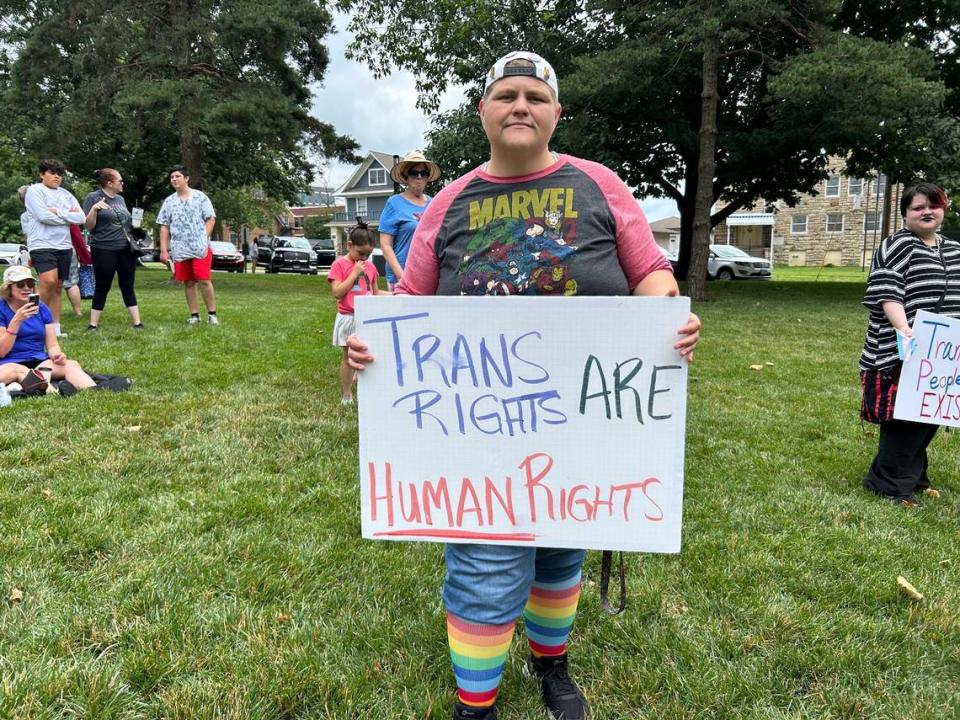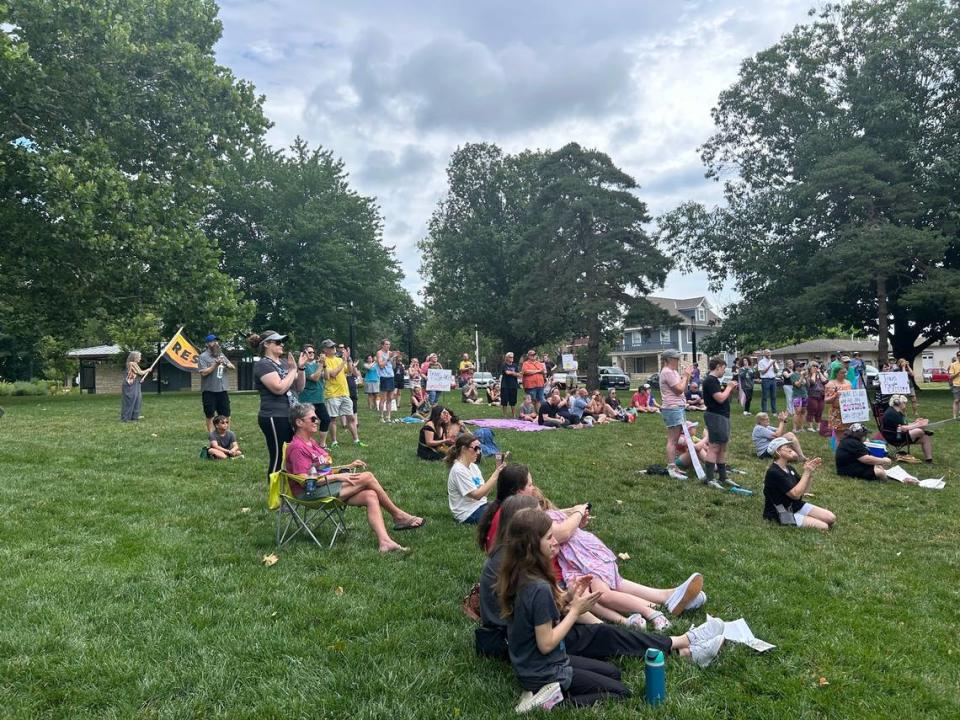‘Every person is welcome’: Kansans protest law seen as attack on trans rights
- Oops!Something went wrong.Please try again later.
Kansans protested across 16 different cities Saturday at the Pride Never Ends rallies, organized by Equality Kansas and Mainstream Coalition, after a new law advocates called an “attack” on transgender citizens went into effect.
The law, SB 180, defines a man and woman based solely on sex at birth. It was the first of its kind passed in the country and took effect Saturday, along with a similar measure in Tennessee.
In Overland Park’s Thompson Park Saturday, a few dozen demonstrators held signs and listened as speakers shared their experiences.
“It’s so hard living in a state that is trying to erase us,” said Hazel Krebs, a trans woman. “I was worried about the fact that I may have to leave.”
Another speaker, Susan Peach, said she fears for her trans teen’s safety at school.
“This new law is intentionally placing her in harm’s way,” she said. “This law is just a bullying law.”

The Republican-controlled Legislature passed the measure this spring over the veto of Democratic Gov. Laura Kelly, with supporters largely focused on what they said was a need to protect the safety of female-only spaces, such as restrooms, locker rooms and domestic violence shelters.
“The purpose of SB 180 was to provide a definition of what a woman is and that anywhere that exists in current statute that that definition is based on biological sex at birth,” state Sen. Renee Erickson, a Wichita Republican, told reporters, adding that “truth matters, biology matters.”
However, the law contains no enforcement mechanism, meaning that even though it requires trans residents to use public accommodations based on their sex at birth, officials have no way to enforce the rule, nor are private citizens authorized to sue over violations.
Both Kelly and Kansas Attorney General Kris Kobach, a Republican, say the law should have no effect on access to public accommodations, but trans residents and their advocates say it will give license for members of the public to harass them.
Jordan Smith, who identifies as gender fluid and uses they/them pronouns, is frustrated with the new law and said many refuse to acknowledge trans people’s identities.
“I don’t feel like there’s an opening in the conversation with these people to say, ‘Hey, I’m not comfortable with that name anymore,’” Smith said. “They’ve known me for so long it’s like, ‘Nope, we do what we want.’”
Kelly and Kobach are in sharp disagreement over whether the law prohibits the Kansas Department of Health and Environment and the Kansas Department of Revenue from issuing new birth certificates and driver’s licenses to trans residents reflecting their gender identity. Kobach has vowed to challenge Kelly in court, after her office said Thursday that officials will continue to follow their current policies allowing for updated IDs.
“As Kansans all across the state rally for equal rights today, I want you to remember: you matter and your voice matters. As long as I’m in office, you will always have an ally and a friend in Topeka,” Kelly tweeted ahead of the rallies Saturday morning.

Under a 2019 consent judgment in federal court, the Kansas Department of Health and Environment is required to issue updated birth certificates to trans residents who request one. Kobach’s office last weekend filed motions in court asking a judge to effectively overturn the agreement. Kobach said this past week that SB 180 requires officials to also revert previously changed ID documents back to their original form.
“The governor’s staff and the governor’s agencies cannot act as if the Legislature did not override her veto. They did override the veto. And so the law is what it clearly is,” Kobach told reporters on Monday.
Kelly maintains that the consent judgment remains binding on KDHE and that officials must continue to follow it. The governor said in a statement on Thursday that while her administration has had “many conversations” with Kobach’s office, “KDHE and KDOR disagree about its impacts on their operations and will instead keep in place their policies regarding gender markers on birth certificates and driver’s licenses.”
Michael Poppa, director of Mainstream Coalition and mayor of Roeland Park, said the law does not change the fact that many Kansans are still rallying behind trans and nonbinary individuals.
“Every person is welcome in Kansas no matter what this legislature says,” he said. “We see you, we hear you and we support you.”
Ralliers also showed up at St. John’s Park in Kansas City, Kansas. Tom Alonzo, state chair of Equality Kansas, said the demonstration is a “wake up” call for citizens who haven’t been paying attention to policies.
“To have all these people in all these towns is a pushback against a legislature that is overrun with people who are just obsessed with nonbinary and trans children,” he said.

